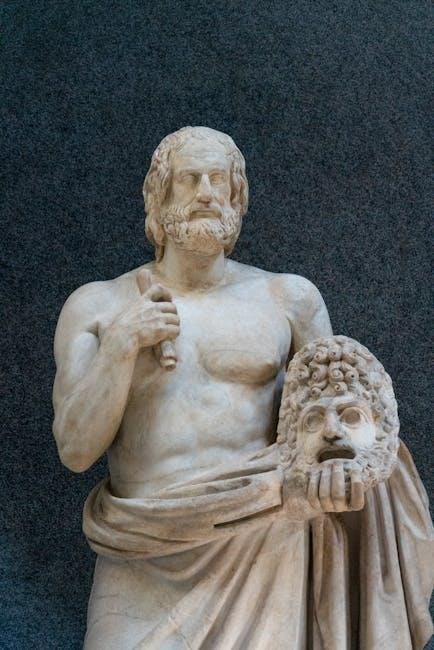
Euripides, a renowned Greek tragedian, lived in the 5th century BCE and is celebrated for his profound exploration of human emotion and societal issues.
His play Medea remains a cornerstone of classical literature, offering a gripping narrative of revenge, love, and betrayal, while its themes resonate strongly in modern contexts.
PDF versions of Medea are widely available, enabling readers to delve into Euripides’ masterwork and appreciate its enduring relevance in understanding human psychology and societal dynamics.
1.1 Background on Euripides and His Role in Greek Tragedy
Euripides was a prominent Greek tragedian, active in the 5th century BCE, known for his innovative and emotionally charged dramas. He wrote over 90 plays, with 18 surviving today, including Medea, which remains one of his most celebrated works. Euripides’ tragedies often explored complex human emotions, moral dilemmas, and the societal roles of women, setting him apart from his contemporaries Aeschylus and Sophocles. His works are widely studied and admired, and PDF versions of his plays, such as Medea, are easily accessible for modern readers.
1.2 The Historical Context of “Medea”
Medea, written by Euripides in 431 BCE, is set against the backdrop of classical Greek society, where mythology and tragedy intertwined. The play draws from the ancient myth of Medea, a sorceress from Colchis, and her tumultuous relationship with Jason. Euripides adapted the myth to explore themes of betrayal, revenge, and gender roles, reflecting the societal tensions of his time. The play’s historical context highlights Euripides’ innovative approach to tragedy, making it a landmark work in Greek literature.

Plot Summary of “Medea”
Medea tells the story of the titular character, a sorceress betrayed by her husband Jason, who seeks devastating revenge by killing his new bride and their children.
2.1 The Story of Medea and Jason
Medea and Jason’s story begins with their escape from Colchis, where Medea, a sorceress, aids Jason in retrieving the Golden Fleece, leading to their marriage and two sons.
However, Jason abandons Medea for Creon’s daughter, Glauce, in Corinth, sparking Medea’s wrath and setting the stage for her tragic revenge, which unfolds with devastating consequences.
2.2 Key Events and Turning Points in the Play
The play opens with Medea’s emotional turmoil as Jason abandons her for Glauce, Creon’s daughter, leading to her vow of revenge.
A pivotal moment occurs when Medea tricks Creon by sending a poisoned dress to Glauce, causing her death and chaos in the palace.
Jason confronts Medea, and in a climactic act, she kills their children to prevent their suffering, culminating in her escape, leaving Jason in despair.

Major Themes in “Medea”
The play explores themes of revenge, gender inequality, and the clash between reason and emotion, highlighting Medea’s struggle against societal norms and personal betrayal.
3.1 The Theme of Revenge and Its Consequences
Revenge is central to Medea, as the titular character seeks devastating retribution against Jason for his betrayal. Euripides masterfully portrays the psychological turmoil driving Medea’s actions, leading to tragic consequences. Her calculated vengeance results in the deaths of her children, Jason’s new bride, and others, illustrating the destructive nature of unchecked anger. This theme underscores the cyclical harm caused by revenge.
3;2 The Role of Gender and Feminism in the Play
Medea is a powerful exploration of gender dynamics, highlighting the oppression of women in ancient Greek society. Medea, as a strong-willed woman, defies patriarchal norms, showcasing her intelligence and agency. Euripides portrays her struggles against societal expectations, emphasizing the limitations placed on women. Her ultimate tragedy underscores the consequences of gender inequality, making the play a seminal work in feminist literature and a critique of patriarchal structures.

Character Analysis
Euripides’ Medea presents complex characters, with Medea embodying both fierce determination and deep emotional pain, while Jason’s betrayal highlights his moral decay, shaping the tragic narrative.
4.1 Medea: A Complex and Tragic Heroine
Medea is a multifaceted character, depicted as a powerful sorceress and a devoted mother, driven by intense emotions. Her pursuit of vengeance against Jason, despite its devastating consequences, showcases her unyielding resolve. Euripides portrays her as a tragic figure, evoking both fear and sympathy, making her one of the most compelling heroines in Greek tragedy. Her complexity continues to captivate modern audiences.
4.2 Jason: The Antagonist and His Moral Decline
Jason emerges as the antagonist, whose betrayal of Medea sparks her vengeance. His decision to abandon Medea for Creon’s daughter reflects his pursuit of power and status. Euripides portrays Jason as morally corrupt, prioritizing political gain over familial bonds. His lack of empathy and self-serving nature lead to his downfall, making him a symbol of moral decay and the consequences of unchecked ambition.

Performance and Adaptation History
Euripides’ Medea was first performed in 431 BCE, captivating Athenian audiences. Its timeless themes have led to numerous modern adaptations, resonating with contemporary issues like gender inequality and power dynamics.
5.1 The Original Performance in Ancient Greece
Euripides’ Medea premiered in Athens during the City Dionysia festival in 431 BCE. The play was presented in an open-air theater, featuring male actors in masks. The chorus played a central role, providing commentary and emotional depth. Despite its controversial themes, the performance captivated the audience, though it initially placed third in the competition. This historic staging laid the groundwork for the play’s enduring legacy.
5.2 Modern Adaptations and Interpretations of “Medea”
Modern adaptations of Medea continue to captivate audiences, reflecting its timeless themes. Stage productions and film interpretations often emphasize Medea’s psychological complexity and feminist undertones. PDF editions and digital resources provide access to diverse translations, enabling fresh interpretations. The play’s exploration of revenge and gender resonates in contemporary contexts, such as the #MeToo movement, making it a powerful tool for exploring societal issues and human emotions.

Psychological and Social Insights
Euripides’ Medea offers deep psychological insights into revenge, betrayal, and gender dynamics, while its social commentary on women’s roles in ancient Greece remains relevant today.
6.1 The Psychological Motivations of Medea
Medea’s psychological motivations stem from a deep sense of betrayal and abandonment by Jason, triggering her desire for revenge. Her actions are driven by a complex mix of anger, hurt, and a need to restore her honor, showcasing Euripides’ masterful portrayal of human emotion and the destructive power of unchecked passion.
6.2 Social Capital and Women’s Influence in Euripides’ Works
Euripides’ works, particularly Medea, highlight the limited social capital available to women in ancient Greece. Medea’s influence stems from her intelligence, magical powers, and strategic thinking, challenging patriarchal norms. Her ability to navigate societal constraints underscores Euripides’ exploration of gender roles and the ways women could exert power in a male-dominated world, offering timeless insights into the dynamics of power and gender.

The Significance of “Medea” Today
Medea remains highly relevant, offering insights into gender inequality, power dynamics, and the consequences of revenge. Its themes resonate with modern audiences, ensuring its enduring appeal and significance.
7.1 Relevance in the Context of the #MeToo Movement
Euripides’ Medea resonates deeply with the #MeToo movement, as it portrays a woman’s struggle against patriarchal oppression and betrayal. Medea’s story symbolizes resistance to systemic gender inequality, echoing modern conversations about power abuse and female agency. The play’s exploration of betrayal, revenge, and societal injustice aligns with the movement’s focus on amplifying women’s voices and challenging oppressive structures. Its themes of female resilience and defiance remain strikingly relevant today.
7.2 Universal Themes That Resonate with Modern Audiences
Euripides’ Medea explores universal themes like love, betrayal, revenge, and identity, which continue to captivate modern audiences. The play’s examination of human psychology, moral dilemmas, and societal expectations remains timeless. Medea’s struggle as a woman and a mother reflects contemporary issues of gender roles and personal autonomy. These themes transcend time, making the play a powerful reflection of human experience and emotional complexity.

Accessing “Medea” in PDF Format
Euripides’ Medea is widely available in PDF format through academic platforms, libraries, and online bookstores like Litres and Google Books. Reliable editions include translations by renowned scholars.
8.1 Where to Find Reliable PDF Versions of the Play
Reliable PDF versions of Euripides’ Medea can be found on academic websites like Google Scholar, JSTOR, and university libraries. Platforms such as Litres and Docsity also offer high-quality downloads. Many translations, including those by E.P. Coleridge and Ian Johnston, are available for free or purchase. Additionally, online archives like the Perseus Digital Library provide authentic and scholarly editions of the play.
8.2 Recommended Translations and Editions
Notable translations of Medea include those by E.P. Coleridge and Ian Johnston, known for their fidelity to the original Greek text. Modern adaptations, such as Gregory Nagy’s revision, offer fresh perspectives while maintaining the play’s emotional depth. Scholarly editions, like those in the “Greek Tragedy in New Translations” series, provide insightful introductions and notes, enhancing comprehension. These editions are widely praised for their accessibility and academic rigor.

Educational Resources and Study Guides
Summaries and analyses of Medea are available in 8 sections, providing detailed insights into the play’s themes and characters. Scholarly articles and critical essays can be found on platforms like Stoa.org and Litres, offering in-depth perspectives for students and researchers.
9.1 Summaries and Analyses for Students
PDF summaries of Medea provide detailed analyses of themes, characters, and plot, broken into 8 sections for easy understanding. These resources include scene-by-scene breakdowns, thematic explorations, and psychological insights into Medea’s motivations; Scholarly articles and critical essays offer deeper analysis, ideal for academic study. Platforms like Litres and Stoa.org host these materials, making them accessible for students seeking comprehensive study aids.
9.2 Scholarly Articles and Critical Essays on “Medea”
Scholarly articles and critical essays on Medea delve into the evolution of Medea’s character, exploring her psychological motivations and societal roles. Abstracts like ЮС Обидина’s work analyze her transformation in classical literature, while others examine themes of revenge, gender, and social capital. These essays provide in-depth analysis of Euripides’ portrayal of Medea, offering diverse interpretations of her actions and their implications, making them invaluable for academic research.
Euripides’ Medea remains a timeless masterpiece, exploring themes of revenge, betrayal, and the human condition. Its relevance in contemporary discussions, such as gender roles and psychological complexity, endures.
10.1 The Enduring Legacy of “Medea”
Euripides’ Medea continues to captivate audiences with its exploration of revenge and human emotion. Its themes resonate across millennia, influencing art and sparking discussions on gender roles and justice.
10.2 Final Thoughts on the Play’s Impact and Importance
Medea remains a timeless masterpiece, offering profound insights into human nature, gender dynamics, and the consequences of revenge. Its psychological depth and universal themes continue to inspire adaptations and discussions, making it a vital work in both classical and modern contexts. The play’s enduring relevance underscores its importance in understanding human emotion and societal struggles, ensuring its lasting impact on literature and theater.
